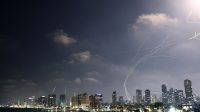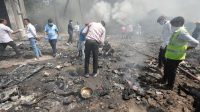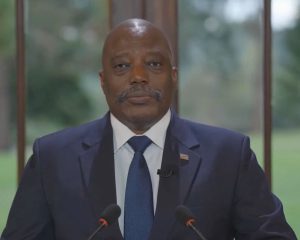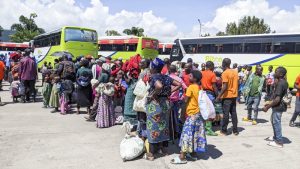Belgium should not pretend to be a peacemaker in DRC crisis
In the armed conflict in the east of the Democratic Republic of Congo (DRC), Belgium pretends to be a peacemaker but it is a warmonger hiding in plain sight.
Belgian foreign minister Maxime Prévot started his five-day diplomatic tour of Africa’s Great Lakes region, on April 25, where he planned to travel to Uganda, Burundi, and DRC to meet various officials and discuss the eastern DRC crisis.
The tour came two days after Kinshasa and the AFC/M23 rebels announced an agreement to work towards a truce and ceasefire leading to dialogue for lasting peace in eastern DRC.
“I welcome the agreement announced by the DRC and the AFC/M23 [rebels] to work towards a truce and ceasefire leading to dialogue to restore lasting peace in eastern DRC. This is a crucial step towards ending the violence. I will travel to the region starting this Friday and express my full support for these efforts facilitated by Qatar and those of the regional organizations EAC/SADC,” Prévot posted on X on April 23, two days before his tour.
With this statement, Prévot pretended to portray Belgium as a peacemaker in the DRC crisis, yet Brussels’ involvement in the Africa’s Great Lakes region, particularly in DRC and Rwanda, has caused and still causes significant damage.
A few hours before Prévot travelled to Kampala, where he started his tour, on April 24, 11 Belgian military instructors attended the launch of a one-month military training programme for the reserve force by DRC’s Deputy Defense Minister, Samy Adubango, at the Bauma camp located in Kisangani, the capital of Tshopo Province. At least 2,800 trainees will undergo that training, with the Belgians being part of the instructors.
It is expected that after the training, the trainees will be deployed to the frontlines in Walikale territory, North Kivu Province, to support the Congolese army coalition against the rebels.
Belgium’s push for military reinforcement of the Congolese army coalition while regional and global leaders call for dialogue to end the conflict peacefully clarifies that the tiny European country can never be a peacemaker in the DRC crisis.
The turbulent situation in eastern DRC is a direct result of Belgium’s colonial rule and sinister machinations. The Berlin Conference of 1884–1885 partitioned Africa among European colonial powers. Without the Berlin Conference, the decades-long persecution of Kinyarwanda-speaking Congolese, especially the Tutsi, would not have existed.
The Kinyarwanda-speaking Congolese found themselves in eastern DRC after the then Rwandan territories of Rutshuru, Bunyabungo, Masisi, Gishali, Tongo, and Idjwi, among others, were added to DRC. Today, the same people who were innocently situated in DRC due to borders drawn by colonial powers are facing an existential threat and are being denied their rights to citizenship.
Instead of backing the regional, Qatari, and US’ efforts to find a peaceful solution to the crisis in eastern DRC, Belgium deployed hundreds of troops to support the regime of Felix Tshisekedi which is killing its own citizens.
On March 17, the Belgian government deployed troops, tanks, and drones to DRC to train and reinforce the Congolese army, FARDC, Wazalendo militias, and the Rwandan genocidal militia, FDLR, to eliminate AFC/M23 rebels who now control swathes of territory in the Kivus. Their official presence is reportedly for training purposes. But Belgian commandos—estimated to number between 300 and 400 soldiers, roughly two companies—are there to engage the rebels directly alongside the Congolese army coalition, which lost large parts of the country’s eastern region despite receiving support from numerous backers, including well-paid European mercenaries, the Burundian army, and the Southern African Development Community.
Evariste Ndayishimiye is the only regional head of state who supports Tshisekedi’s military approach to the DRC crisis. Belgium is treating Burundi as an ally and transit centre for military support that Brussels sends to Kinshasa.
Since the fall of Goma, the largest city in eastern DRC, on January 27, leaders from the Southern African Development Community (SADC) and East African Community (EAC) have been working tirelessly to find a peaceful solution to the crisis. However, Belgium, Burundi, and DRC have increased efforts in their military alliance, preparing heavy attacks against the AFC/M23 rebels.
In mid-March, there were a number of military flights from Brussels to Kinshasa, Brussels to Bujumbura, and Kinshasa to Bujumbura. Some were carrying military delegates, while others carried logistics.
How would Prévot express his “full support for the efforts facilitated by Qatar and those of EAC and SADC,” while Belgium is deploying troops to attack the AFC/M23 rebels?
After meeting Ugandan President Yoweri Kaguta Museveni, Prévot posted on X, “I continue to Burundi and the DRC, with one goal: advancing peace and partnerships across the region.” But the peace, he says, differs from the peace his country is contributing to on the ground.
Regarding the current enhanced military cooperation between Belgium and DRC, with Burundi as a workshop for preparation of attacks against the AFC/M23 rebels, Prévot’s tour is not really meant for the region but for DRC and Burundi. His Kampala sojourn was merely a decoy to mislead the international opinion about Brussles’ real intentions in the region.






